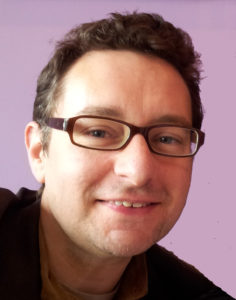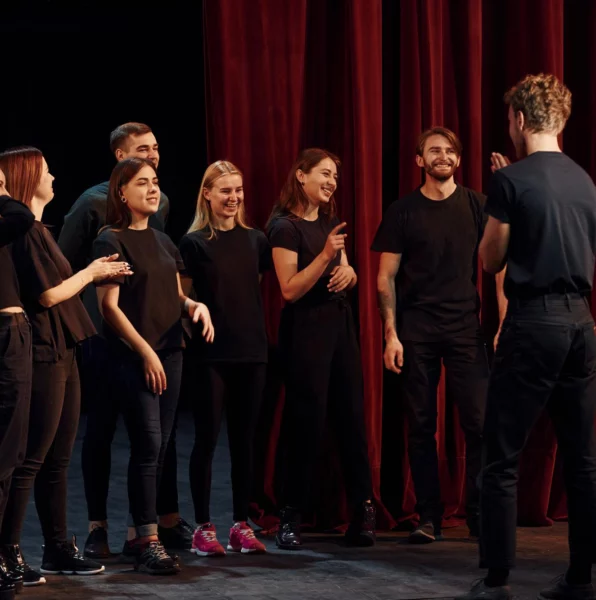What do scientists think about public engagement? What are the challenges, benefits or barriers? Together teams of the Wellcome Genome Campus, Cambridge and the EMBL Heidelberg conducted a survey at research campuses both in Germany and the U.K. whose results will be presented at the upcoming Forum Wissenschaftskommunikation. We spoke with Kenneth Skeldon from the Wellcome Genome Campus who will be hosting the panel.
“Public engagement is at its best when the researchers benefit from it as well”
Mr. Skeldon, you will be hosting a session called “What are the Challenges and Opportunities Around Scientists as Communicators?” What is the main goal of the session?
We will be looking at the opportunities, the challenges, the benefits and the barriers for researchers to become involved in public engagement. We will explore the views of the scientists on these issues and also highlight differences between Germany and the U.K. based on surveys we have conducted at research campuses in both countries. We will present the results at the Forum Wissenschaftskommunikation for the first time and look forward to discussing them with the panel and the audience.
Even though the results are not out yet, you have years of experience in the field. So what are the main obstacles you experience in your daily work regarding science communication?

From my experience the main obstacles are time pressure and the expectations on researchers around applying for grants and publishing in big journals. However, there’s also evidence that researchers would value more confidence building, training and support to become involved in public engagement, especially among those at earlier stages of their career.
Why do you think it is important to get scientists involved in public engagement and communications?
I think there is a difference between science or research communication and public engagement that sometimes gets overlooked. There will always be an urge to publish the latest scientific results and also to communicate them to the general public and that should of course be done and is important. But effective public engagement differs from that as it starts earlier and in my opinion that is a very important benefit for many reasons.
What are those reasons?
One of the benefits is that you develop a closer relationship to the people that may be affected by the outcomes of the research and that could even help to shape those outcomes, for example in terms of how they are applied. Also, there is a sense of accountability at play, as a lot of science research is paid for by the tax payers. Thus, showing the whole life-cycle of science helps build trust. Those are high level benefits, but even on a more personal level getting involved in public engagement can offer researchers different skills, perspective and experiences. Thinking of my own research career, this made me more open about my research and ask different questions from those I was discussing among my peer-groups.
Overall, I think public engagement is at its best when researchers benefit from it as well. Maybe that’s because the skills developed make for sharper presentations at conferences or perhaps its the wider outlook around thinking of the impact of research, which is increasingly important to funders.
Has the willingness of scientists to become involved changed?
I think there has been a change for the better. Research funding these days certainly values and embeds public engagement more than it did. That is true both on a national level as well as on an EU level because for example the Horizon 2020 programme has a focus on public engagement and the wider responsible research and innovation agenda. This has certainly helped in getting more people involved. However, I still think it also depends on the individual and their circumstances. There will be people who don’t feel comfortable with it and people who are very enthusiastic to embrace everything they can. What is important for me, with this in mind, is to highlight that there are lots of different ways to get involved in public engagement. This means that you don’t necessarily have to do something that is totally out of your comfort zone.
How can organisations and communicators help scientists to become involved in public engagement?
It is a combination of providing opportunities and sharing the skills. We should make it easy for scientists to get involved because many people want to get involved but don’t have the time or willingness to organise something themselves, or perhaps are unsure about taking first steps. As a community working together, we can help overcome confidence issues by providing training and support, backed up with lots of experiences gathered over the years.
Do you think the current scientific system is doing enough to get scientists involved in public engagement?
I think there are certainly organisations that are taking a leading role in it. Wellcome, for example, has been pioneering in this area for many years, with funding available for public engagement activities as part of their research grants. This definitely helps, and encourages researchers to think of public engagement alongside their research and its potential impact. There is more to be done especially in terms of what can be influenced by the different country’s decision makers and funding bodies. However, it shouldn’t ever be all about the stick and we don’t want to create a culture where researchers only do public engagement because they have to do it to get funding.
We want to create a culture were there is a range of different ways of getting involved and were there are different opportunities available to suit the diversity of research areas and the wide spectrum of indivdual motivations. At institutional levels, we need to be thinking of the recognition placed on engagement activity. It is difficult, because it isn’t always easy to compare participation in wide ranging public engagement activities in the way people compare and understanding research output metrics. However it is a challenge that we, as a community, should all embrace – working towards a value culture for public engagement within research that positions it as an embedded benefit rather than a competing pressure.
Kenneth Skeldon will present the new results in his session „What are the Challenges and Opportunities Around Scientists as Communicators?“ on November 8th, 10.30, at the Forum Wissenschaftskommunikation.
The Forum Wissenschaftskommunikation is organized by Wissenschaft im Dialog (WiD), one of the partners of our website Wissenschaftskommunikation.de.






